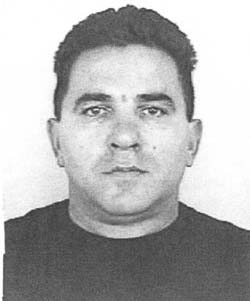 Naser KelmendiThree law enforcement agencies in Bosnia-Herzegovina (BiH) have spent years investigating Naser Kelmendi, a Sarajevo businessman who came to the country from Kosovo soon after the war in BiH and built what investigators describe as a Balkan criminal empire.
Naser KelmendiThree law enforcement agencies in Bosnia-Herzegovina (BiH) have spent years investigating Naser Kelmendi, a Sarajevo businessman who came to the country from Kosovo soon after the war in BiH and built what investigators describe as a Balkan criminal empire.
Kelmendi, his sons and his half-brother, Bećir, run a number of firms in BiH, Montenegro, Serbia and Kosovo, and do business with some of the region’s big businessmen.
The State Investigation and Protection Agency (SIPA) has collected an extensive dossier on Kelmendi, 52, who they say has a criminal organization with connections to influential people.
Federation of BiH (FBiH) police officials say their colleagues across Europe are acquainted with his history; SIPA officials gave a presentation on Kelmendi to Interpol in Lyon, France in 2008.
Although there have been numerous complaints against him, he has never been to trial in BiH.
Interviews with BiH police investigators make it clear they consider him extraordinarily intelligent and wise. They say Kelmendi controls drug trafficking regionally. Despite those suspicions, police officials in Sarajevo and Zenica gave Kelmendi and two of his sons gun permits – even while one faced an indictment for carrying illegal weapon -- while customs officers from Zenica allowed importation of armored cars for personal use and underestimated the true value of the cars.
In Sarajevo Canton, police have filed at least 13 criminal complaints in the past five years against Kelmendi and his sons Elvis, Liridon and Besnik, including charges of murder, attempted murder and assault.
While Naser Kelmendi has never been to trial, two of his sons and his half brother have been convicted of relatively minor charges in Sarajevo Municipal court.
On May 10, 2004 Bećir Kelmendi was sentenced to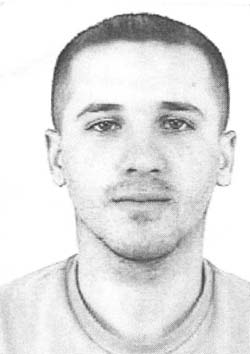 Besnik Kelmendisix-months probation for purchase and carrying a gun without a permit; On April 5, 2006, Liridon Kelmendi was given seven months probation for carrying a weapon and ammunition without a permit; and on July 2, 2009 Elvis Kelmendi received a one-year probation for violent behavior. He pleaded guilty for hitting a man three times in face and hitting women with a fist.
Besnik Kelmendisix-months probation for purchase and carrying a gun without a permit; On April 5, 2006, Liridon Kelmendi was given seven months probation for carrying a weapon and ammunition without a permit; and on July 2, 2009 Elvis Kelmendi received a one-year probation for violent behavior. He pleaded guilty for hitting a man three times in face and hitting women with a fist.
Naser Kelmendi would not speak to the Center for Investigative Reporting in Sarajevo (CIN), said his lawyer, Midhat Kočo. But Kočo did lash out at local media, particularly CIN.
"Because, in our opinion, you journalists have written so much just from your head that you don’t deserve our attention and confidence that we should talk to you," Kočo said. "Especially from CIN. It is tragic."
"So much harm was brought against him in, let’s say, the last couple of years. His hotel was raided five or six times. They never found even a match which was illegitimate. ... There is no need for us to justify ourselves – if we are guilty of something, we will be held accountable."
In fact, in an April 2005 raid, Kelmendi’s son Liridon was found with an illegal fire arm during one of the raids. Whether the Kelmendi’s will be held accountable depends largely on Canton Sarajevo prosecutors who have combined 12 open criminal reports against the family into one case which is currently being investigated.
Meanwhile, SIPA has been looking into the international affairs of Kelmendi and his connections with influential people in BiH and the region.
In SIPA’s Interpol presentation, obtained by CIN and titled "Naser Kelmendi’s Criminal Organization," the agency outlined what it knew about Kelmendi at a November 2008 meeting at the General Secretariat of Interpol in Lyon, France. The SIPA document alleges that Kelmendi heads one of the best organized criminal organizations not only in BiH, but in the whole region. The Kelmendi organization has allegedly been involved drug and cigarette trafficking, money laundering and loan sharking.
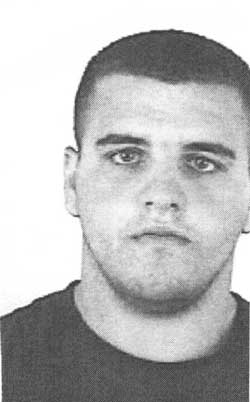 Liridon KelmendiAccording to the report, the organization includes his sons Elvis, 31, Besnik, 29, and Liridon, 26, the elder Kelmendi’s companion, Jasmina Babić, from Serbia, his half brother, Bećir, and his cousin from Germany, Redžep (also Rexep) Kelmendi. In BiH, it listed organization members in Sarajevo, Tuzla and Zenica, and said its influence reaches to Montenegro, Kosovo, Macedonia, Croatia, Serbia, Germany and the US.
Liridon KelmendiAccording to the report, the organization includes his sons Elvis, 31, Besnik, 29, and Liridon, 26, the elder Kelmendi’s companion, Jasmina Babić, from Serbia, his half brother, Bećir, and his cousin from Germany, Redžep (also Rexep) Kelmendi. In BiH, it listed organization members in Sarajevo, Tuzla and Zenica, and said its influence reaches to Montenegro, Kosovo, Macedonia, Croatia, Serbia, Germany and the US.
Apart from the Kelmendis, the report lists his closest associates. Among those whose names were included in the report were Fahrudin Radončić, the owner of the Avaz publishing house, Naser Orić, former commander of the Srebrenica defense, Nihad Bojadžić, a brigadier of the BiH Army, Kosovo businessman Ekrem Luka and a former prime minister of the Kosovo government, Ramuš Haradinaj, as well as wealthy Montenegrins Rok Stanaj and Safet (aka Sajo) Kalić. It is not clear what the information in the report is based on.
Radončić has denied being friends with Kelmendi. However, Kelmendi has had business dealings with Radončić’s company, Avaz. The deals include a real estate swap in 2004 in which Avaz gave Kelmendi land and a 447-square-meter house on Velika Aleja in Ilidža, where Kelmendi also owns the Hotel Casa Grande. In exchange, Avaz got 120 square meters of office space in the Jabuka Building in Zenica from Kelmendi. The house was valued at 500,000 KM, while the space in Zenica was valued at 300,000 KM with Kelmendi paying the difference to an Avaz account, according to municipal court records in Sarajevo. A year later, Kelmendi arranged the purchase of two Jeep Grand Cherokee sport utility vehicles and had them armored in the US and shipped to BiH, despite a US prohibition against the sale.
One of the Jeeps arrived in Bosnia and is currently registered to Radončić’s newspaper, Avaz. In a recent interview Radončić told CIN that the director of Avaz bought the Jeep and it is rented to high-profile guests of his hotel.
Kelmendi is also named in the report as being close to Naser Orić, the former Bosnian commander who served in Srebrenica and who in June was convicted but is now appealing his two year prison sentence for the illegal possession of weapons. Kelmendi’s lawyer Midhat Kočo, while testifying in April before the municipal court in Sarajevo said that Orić at one time lived and trained at the hotel Casa Grande.
Kelmendi first shows up in criminal records in 1976 in his hometown of Peć when as a 19-year old he was sentenced to 18 months in prison for attempted murder. Serbian Ministry of Interior records from before the Kosovo war say Kelmendi was cited for brawling and violent behavior.
According to the SIPA presentation issued in Lyon, he smuggled textiles and gold into Kosovo from Turkey during the 1980s. In the 1990s, while the former Yugoslavia was under international sanctions, he smuggled oil, tobacco and drugs. The agency also alleged that Kelmendi was involved in arms smuggling in the run-up to the war in Kosovo.
Interpol data shows that Naser Kelmendi was under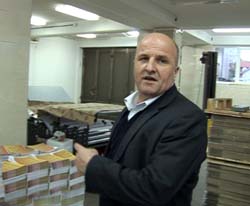 Ekrem Luka said he did not see Naser Kelmendi since before the Kosovo war.investigation in 2003 for suspicion of arson and planting a bomb but was never charged. Kelmendi was suspected of extortion, according to Interpol files, and in the Peć area he was allegedly involved in the illegal foreign exchange business, cigarette smuggling and illegal trade the data says. Interpol has information that someone named Naser Kelmendi battled Ekrem Luka, a businessman from Peć. During the feud, Kelmendi left Peć and moved to Sarajevo, according to Interpol files.
Ekrem Luka said he did not see Naser Kelmendi since before the Kosovo war.investigation in 2003 for suspicion of arson and planting a bomb but was never charged. Kelmendi was suspected of extortion, according to Interpol files, and in the Peć area he was allegedly involved in the illegal foreign exchange business, cigarette smuggling and illegal trade the data says. Interpol has information that someone named Naser Kelmendi battled Ekrem Luka, a businessman from Peć. During the feud, Kelmendi left Peć and moved to Sarajevo, according to Interpol files.
Luka, one of the richest men in Kosovo, told CIN that he had no ax to grind with Kelmendi. He said that he had not seen him since the war in Kosovo.
Local records show Kelmendi became a BiH citizen as early as 1998.
In a statement to Sarajevo Canton prosecutor Oleg Čavka on September 3, 2007, Kelmendi said that he came to Sarajevo in 1988 and stayed until shortly before the war broke out in BiH in 1992.
"In this period (before the war) I had two shops in Sarajevo: a fur parlor and a jewelry store. Both shops were located in Skenderija," he said in the 2007 statement.
He added that in Peć he had a company which continued to operate. He ran a cigarette wholesale business in Kosovo and once tried to start a cigarette business in Sarajevo. But Kelmendi testified that he failed to gain approval.
"It was doing a business involving cigarettes Memphis and Ronson which I run with my friends. Those are Branko and Staša who are still running that business in BiH," from Kosovo, he said.
Of his sons, he said at the time that Liridon ran a fur and jewelry shop, Besnik ran a gas station and a company, while Elvis did not have a business of his own, but helped other family members, the elder Kelmendi said.
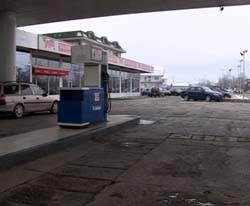 Gas station DonaShell with car and furniture shops, market and motel are owned by Kelmendis.In the 2007 statement, Kelmendi told prosecutors he has been involved in trade businesses for 30 years and did nothing else. He added that he was building a hotel in a Montenegrin resort town of Ulcinj, and that he planned to go into the hospitality business there. He said that he had a trading company in Dubai, in a duty-free zone.
Gas station DonaShell with car and furniture shops, market and motel are owned by Kelmendis.In the 2007 statement, Kelmendi told prosecutors he has been involved in trade businesses for 30 years and did nothing else. He added that he was building a hotel in a Montenegrin resort town of Ulcinj, and that he planned to go into the hospitality business there. He said that he had a trading company in Dubai, in a duty-free zone.
Kelmendi also said that he had seven or eight vehicles that were temporarily registered on the company name. He reported owning a Hummer, an Audi A8 and a BMW X5 SUV.
His interest in cars has drawn attention from authorities, said an associate.
According to Nihad Imamović, president of the board of directors of ASA Group that includes the Sarajevo-based ASA, Kelmendi buys 10 cars a year.
Imamović said that police investigators have inquired about the purchases and taken documents related to Kelmendi’s purchases and payments.
Imamović said that Kelmendi buys different types of cars, from the more luxurious to the cheaper models of VW, and that he had no outstanding debts.
In BiH, one of his first business moves had nothing to do with cars. He incorporated a trading company in October 1998 in Sarajevo, under the name of Miss Donna. When he liquidated it in April 2003, the company account showed only 31.5 KM. According to court records, Miss Donna had no business dealings nor was it registered with the Tax Administration.
In December 2005, his half brother Bećir founded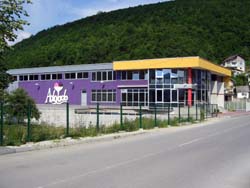 Factory Adolado was built in 2008 and on sale a year later. Adolado, an ice cream manufacturing company, with 2,000 KM according to court records. Kelmendi told prosecutors he owned the company. However, it is not clear how long or even if it ever operated. The company bought or acquired a 2,000-square-meter factory space in 2008 but put it up for sale a year later.
Factory Adolado was built in 2008 and on sale a year later. Adolado, an ice cream manufacturing company, with 2,000 KM according to court records. Kelmendi told prosecutors he owned the company. However, it is not clear how long or even if it ever operated. The company bought or acquired a 2,000-square-meter factory space in 2008 but put it up for sale a year later.
In Belgrade in November, 2006, he incorporated a branch office of his Sarajevo firm Casa Grande and appointed Besnik as director. This company was registered at the outskirts of Belgrade in Surčin, but CIN reporters found no firm there. Serbian police also checked the location but found nothing but a house, leading them to assume it was a front company, according to investigative records. The company had no account open with a commercial bank, and no registered workers or vehicles, according to a Serbian investigators report that was sent to Interpol.
Naser Kelmendi also has large sums of cash propping up his loan business, police investigators said. According to SIPA, Kelmendi had 20 million KM in circulation in 2005 and 2006, which he lent out at a monthly interest rate of 10 percent.
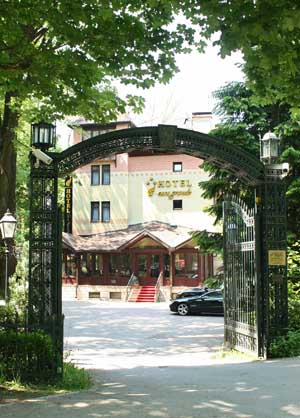 Casa Grande, hotel owned by Naser Kelmendi, was raided five or six times by police, according to his lawyer Midhat Koco.Land and business records show Kelmendi has many real estate holdings throughout the region. In Sarajevo, he owns three houses, two apartments and his Casa Grande Hotel. In Podgorica, Montenegro he owns an apartment. In Montenegrin resort town of Ulcinj he has an apartment, 11 housing units of total size of 377 square meters, a house and a 1,600-square-meter apartment building. He has businesses registered in BiH, Serbia and Kosovo, among other spots.
Casa Grande, hotel owned by Naser Kelmendi, was raided five or six times by police, according to his lawyer Midhat Koco.Land and business records show Kelmendi has many real estate holdings throughout the region. In Sarajevo, he owns three houses, two apartments and his Casa Grande Hotel. In Podgorica, Montenegro he owns an apartment. In Montenegrin resort town of Ulcinj he has an apartment, 11 housing units of total size of 377 square meters, a house and a 1,600-square-meter apartment building. He has businesses registered in BiH, Serbia and Kosovo, among other spots.
He also has the citizenship of that country, according to Milan Davidović, a Serbian law enforcement officer.
Kelmendi’s dealings have caught the attention of law enforcement agents in Serbia, Croatia and other Balkan countries, and many European agencies have been given the 2008 Lyon SIPA report.
In his 2007 statement before the prosecutor Čavka, Kelmendi denied any involvement in drug trade and said he had a firm stand against it.
"I hate drugs and everything that goes with it," he said then.
Police agencies don’t buy that assertion. A European Union Police Mission (EUPM) advisor informed Tuzla Canton police that Kelmendi may have had involvement in a shipment of 10 kilograms of heroin in February, 2004, from Srebrenik via Ljubljana to Germany.
FBiH police received information from Slovenian police that he was in Ljubljana at the time with Jasmina Babić.
No charges were filed in the drug case.
Miodrag Laković, the head of the Narcotics and Smuggling Department in the Montenegrin police, said Kelmendi is an important person for the Montenegrin police.
According to Interpol information that CIN has obtained, Montenegrin police recorded stays of Naser Kelmendij and his sons in Ulcinj in 2007. They often came to the coastal town in luxury cars, including a Ferrari driven by Naser's son Liridon, according to their records.
According to the Interpol documents and SIPA reports outlining some of his closest associates, Kelmendis were seen in Montenegro in the company of: Fatmir Mujaj and Almir Kukan, cousin Redžep Kelmendi (aka Đeka), Nusret Gaši, Hajdar Ćufaja. Ćufaj, according to Interpol, bought land with Kelmendi in Ulcinj.
Even though he has spent much time in Montenegro and BiH, Kelmendi is still remembered in Kosovo.
Rrahman Sylejmani, aide to the police commissioner of Kosovo, told CIN reporters in the spring of 2008 that, according to his information, Kelmendi would likely be detained if he returned to Kosovo. Sylejmani said he also had information that Kelmendi owed money to Ekrem Luka and other businessmen in Peć.
"We had information that he was not feeling safe in Kosovo because there are criminal organizations here who are rivals," explained Sylejmani.
Sarajevo investigators also looked into complaints from rival crime gangs that Kelmendi conspired with Muhamed Ali Gaši in June 2007 to kill Ramiz Delelić (Ćelo), a long-time organized crime figure who had clashed with members of the Albanian mafia in Sarajevo for years.
A week after the murder police tried to question Kelmendi and Gaši, but could not track them down.
Prosecutors also said – but never proved-- they were involved in other crimes, including attempted assassinations, planting a grenade under a rival’s car and tossing a bomb into a house.
Kelmendi was not charged with wrongdoing in connection with the murder. Gaši was found not guilty but has been sentenced to 20 years on unrelated crimes.
By The Center for Investigative Reporting in Sarajevo.




